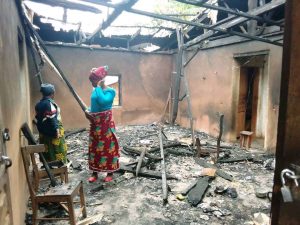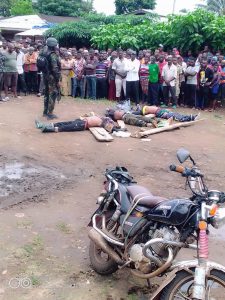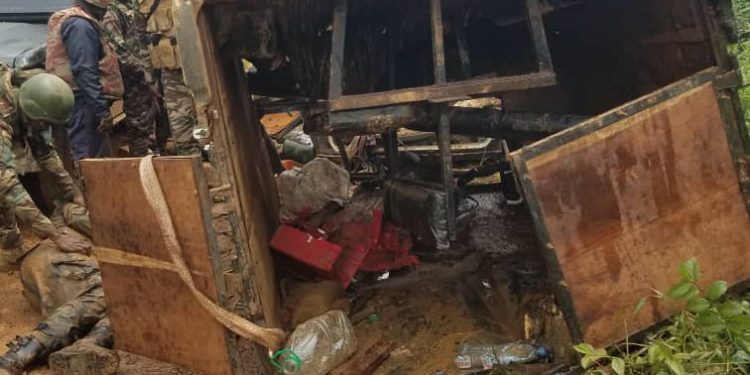By Nalova Akua
The April 12 defence pact opens the window for Moscow and Yaounde to share military intelligence, conduct joint-military training and engage in the fight against terrorism and piracy. Cameroon is currently dealing withBoko Haram and Islamic State of West Africa (ISWAP) insurgents in its northern region; a secessionist rebellion in its western regions and Central African Republic rebels along the eastern borders.
The five-year-renewable deal has cast doubts on Cameroon’s future relationship with its traditional western allies notably Washington, Paris and London.
“Perfect timing for Yaounde to milk Moscow and get the best defence deal without sweat – but this could backfire in the medium to long term if Washington, Paris and NATO allies begin to witness Russian boots on the ground just as in the cases of Mali and the Central African Republic,” says David Otto, a native Cameroonian and director of counterterrorism for the Geneva Centre of African Security and Strategic Studies.
“It clearly indicates that Yaounde is ready to abandon the French connection, US and other NATO allies – to form a new partnership alliance with Moscow based on mutual respect and non-interference in domestic affairs of both partners – Yaounde considers a no-strings-attached defence alliance as best suitable to how it prefers to pursue its national threat dynamics in the East, Far North and South/North West regions,” Otto told News Upfront.
For Putin, desperately in need of friends as it pursues its assault on Ukraine, a deal with Cameroonseems a carefully calculated, deliberately executed decision.
“For Moscow, the timing of the deal is strategic and sends a clear message to western NATO allies like France and US that Kremlin is progressing with its geopolitical spheres of influence in Africa – and that it is presenting a better defence alliance to former French strongholds in the Sahel and Central Africa – Cameroon is the new trophy for Moscow,” Otto said.
In 2015, Russia accepted to provide advanced military hardware to Cameroon to help in its fight against militant islamist group, Boko Haram in a similar deal. Cameroon was one of the eight African countries that did not submit a vote in the UN March 2, 2022, resolution to condemn Russia’s invasion of Ukraine.
“This decision may have caught the eyes of Moscow and the defence deal could be a reward for Cameroon’s rebel against the United Nations Security Council vote,” Otto said.
“Yaounde is known to be shrewd at playing geopolitics by knocking the heads of the East and West, playing the sovereignty and neutrality card to suit its national agenda.”

Former President, Barrack Obama deployed300 U.S. service members, supported by surveillance drones, to help Camerooncounter Boko Haram in 2015. Cameroon was one of the 22 African countries to receive US Special Operations forces in 2019. But concerns over human rights violations pushed the US to cut defense assistance to Cameroon – including plans to supply armored vehicles – same year.
As a former colonial master, France has been a major arms supplier to Cameroon, the bulk of which are often used in the fight against the Boko Haram terrorist group. In January, new evidence emerged detailing how Britain supports 89-year-old President Biya’s regime and conducting six secret counter-terrorism operations in the country in 2021 alone.
“This deal represents another heavy stab on the back of the US, France and other western Allies who are partnering with Cameroon in the global war on terror,” Otto said.
“By signing a new defence pact with Moscow, US allies will read this as Cameroon taking side with Russia over its invasion of Ukraine. In the current fragile political dispensation, any friendly country to Russia is an enemy of the West,” he said, further hinting this could lead to “potential review of the French and US assistance given to Cameroon”.
The greatest threat to Cameroon’s sovereignty and security today remains the quest by Anglophone secessionist militants to form a breakaway state which they call “Ambazonia”. At least 6,000 people have died in Cameroon’s two Anglophone North West and South West regions since 2016, after English-speaking lawyers and teachers in those territories took to the streets to protest the appointment of French-speaking teachers and magistrates in Anglophone schools and courts. Over 2.2 million others – or one in two inhabitants – are currently in need of humanitarian assistance, according to the UN.
“Historical “second class” treatment of Cameroon’s Anglophone people for decades boiled over in 2016 when the Francophone-led Government tried to further ‘de-Anglicize’ the region by subverting its historical traditions and language,” former United States Assistant Secretary of State for African Affairs, Tibor Nagy told News Upfront.
“What started as peaceful demonstrations have degenerated since because of Government’s violent response,” he said.
“Anglophone residents seem to favor full separation and independence as the only way to gain their full rights.”
The conflict stems from Cameroon’s past, first as a German colony that was later split between France and Britain. French Cameroon gained independence in 1960, joined by English-speaking Cameroonians through a federation a year later after a vote by the United Nations. In 1972, both the English- and French-speaking parts of Cameroon became one country, rather than being governed separately.The French-speaking section constitutes about 80 percent, while the English-speaking section constitutes about 20 percent, both in territory and population.
Otto said the defence alliance between Cameroon and Russia is open-ended and does not limit force deployment exchange to a specific threats – including the Anglophone separatist revolt.
“It is likely we shall see Russian boots on ground soon but there is no evidence yet to conclude whether private military contractors(PMCs) or the so-called Wagner Group will benefit from this alliance,”he said.
“The separation war in the anglophone region is purely asymmetric and the deployment of Russian troops is unlikely to make any significant battlefield gains. These forces are not familiar with the environment.”
Nagy said Cameroon’s decision to sign a defense deal with Russia is ill-timed at best.
“The Cameroonian Govt made a statement (whether intended or not) by signing such an agreement while Russia is carrying out a colonial-imperialist war against a neighbor,” Nagy said.
“Given Africa’s tragic history with colonialism, the Continent should be more sensitive to such aggressions than anyone,” he said.
But the deal could eventually serve as a trump card for the Anglophone separatist leaders.

“The Anglophone community can highlight this in both Washington and Paris (and London, Ottawa, etc.) and point out that this is a hostile act by the Cameroonian Govt against US, French, Western interests and that Southern Cameroons would never support such a military pact,” Nagy said.
Otto made the case for the Cameroon-Russia military pact producing a knock on effect in other African countries.
“Should Russian defense pact with no strings attached partnership prove to be more effective and sustainable in the short and long term – there is a real risk that beyond Russian presence in Sudan, Libya , CAR, Mali, Cameroon , more African states could follow the Eastern defence route – shifting the balance of power. A Perfect recipe that could escalate to a Third World War,” he told told News Upfront.
“Most African states currently aligned to the west will be closely watching and comparing the impact of a Russian defense partnership to internal peace and stability especially African states that either boycotted, voted against or selected to vote neutral in the UN vote to condemn the Russia invasion of Ukraine.”








